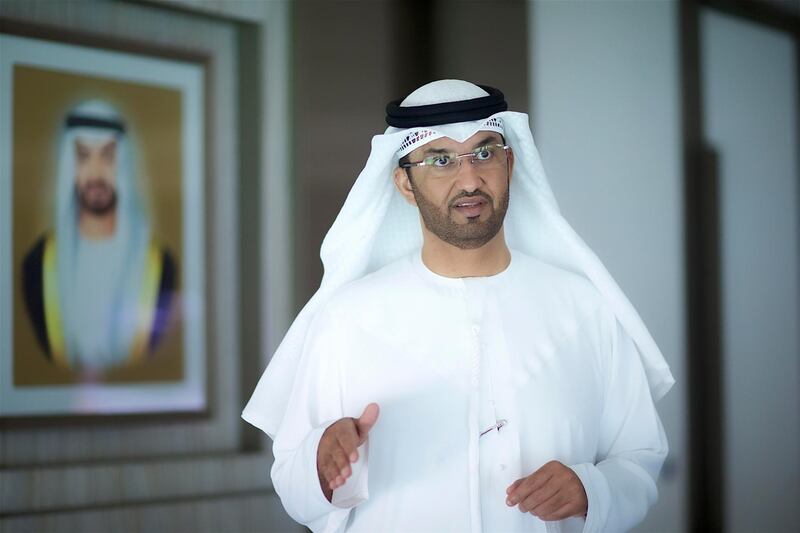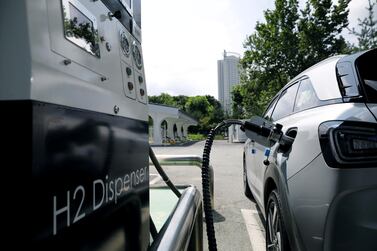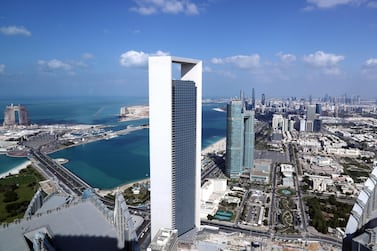The UAE will continue to explore its hydrocarbon reserves and attract investment into its oil and gas sector as it prepares to meet the world's long-term energy needs.
"We will not leave any opportunity unturned," Dr Sultan Al Jaber, Minister of Industry and Advanced Technology and group chief executive of Adnoc, told the Financial Times.
“We are continuing exploration programmes, identifying proven reserves, increasing production and, wherever we can, we will attract strategic partners.”
Adnoc intends to raise output from about 4.2 million barrels per day to 5 million bpd by 2030.
Hydrocarbons will still play a long-term role in the global energy mix despite the pivot towards greener energy.
Dr Al Jaber said global consumption is expected to recover to 105 million bpd by 2030.
“We are a long-term player. The future will require more oil and more hydrocarbon resources ... being the lowest-cost producer will always give us a competitive edge,” he said.
The UAE is part of the 23-member Opec+ alliance of producers that agreed to curb output by a record 9.7 million bpd last year to rebalance oil markets.
The curbs have since been eased to 7.2 million bpd and Dr Al Jaber said the “interim” measures are not in conflict with Adnoc’s long-term goals.
The country, Opec's third-largest producer, has invested heavily in the exploration of new oil and gas resources in recent years.
In November, Abu Dhabi’s Supreme Petroleum Council announced the discovery of 22 billion stock tank barrels in recoverable, unconventional oil resources.
It also said conventional oil reserves had increased by 2 billion STB to 107 billion STB.
At the same time, the council approved Adnoc’s plans to spend Dh448 billion ($122bn) over the next five years, of which Dh160bn has been earmarked for the local economy.
Adnoc awarded exploration rights for Abu Dhabi’s Offshore Block 3 to a consortium led by subsidiaries of Italy’s Eni and Thailand’s PTT Exploration and Production Public Company in December after the conclusion of its second upstream bid round.
The partners are investing up to Dh1.51bn into the project.
Adnoc also awarded Occidental Petroleum exploration rights to Onshore Block 5 in a Dh514m contract last year.
"This oversupply of oil right now is not going to last," the Financial Times cited Vicki Hollub, chief executive of Occidental Petroleum, as saying.
Given rapid recoveries in China and India, the global distribution of coronavirus vaccines and recent lack of investment by many other companies, “this is going to cause an oil shortage and [Dr Al Jaber] ... understands this”, she said.
The oil and gas sector is a major FDI contributor to the UAE's economy and accounts for about 42 per cent of Abu Dhabi's revenue.
Adnoc has already attracted billions of dollars through deals that leverage its asset base.
The company has attracted Dh237bn in FDI flows over the past few years, bringing on board global investors such as the world's largest asset manager, BlackRock, private equity company KKR and Singaporean wealth fund GIC.
Bruce Flatt, chief executive of Brookfield Asset Management – part of a consortium that invested in Abu Dhabi's gas pipelines last year in a $20.7bn deal – said foreign partners had been reassured because Dr Al Jaber "has lived up to everything he has said", according to the Financial Times.
The aim of the deals, Dr Al Jaber told the paper, is to "stretch the value" of every barrel of oil and contribute to diversification beyond oil to future-proof Abu Dhabi and the UAE.
Dr Al Jaber was "a tough but fair" negotiator, said Adebayo Ogunlesi, chairman and managing partner of Global Infrastructure Partners, one of the consortium members that invested in Adnoc's pipelines.
Adnoc will continue to work with investors on conventional hydrocarbon discoveries and is forming new partnerships to improve its green hydrogen capabilities.
“We must be lower-cost and the lowest-carbon [producer],” Dr Al Jaber said.
Adnoc, Mubadala Investment Company and Abu Dhabi's industrial holding company ADQ signed an agreement to form a hydrogen alliance focused on the production of green and blue hydrogen.
The alliance intends to make Abu Dhabi the “trusted exporter of hydrogen to emerging international markets and build a substantial green hydrogen economy in the UAE”.
Adnoc also plans to establish a "hydrogen ecosystem" and unveiled plans in November to boost production of hydrogen, which is already used in its downstream sector.









